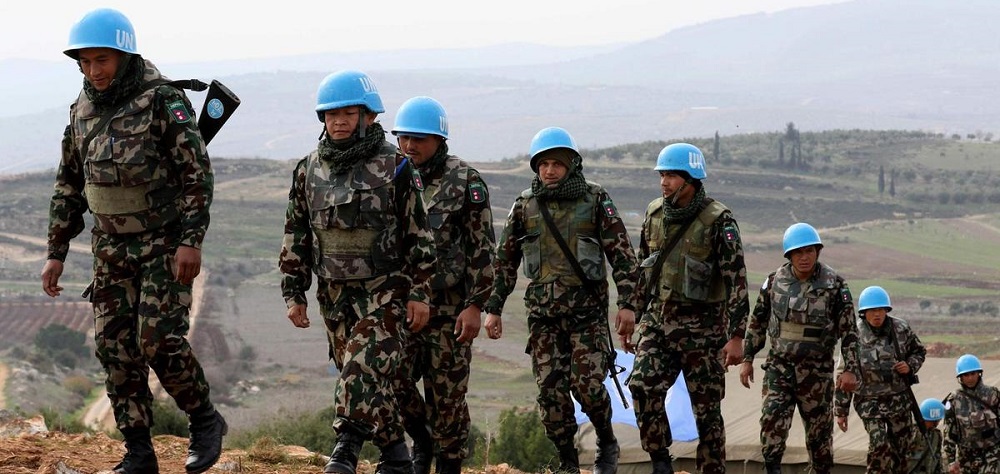Alwaght- As the mandate of the United Nations Interim Forces in Lebanon (UNIFIL) expires on August 31, Western countries began their activities in the UN Security Council for changes to nature of the mission and time of the international forces in southern Lebanon.
Still, the Security Council has not yet reached a consensus on the peacekeeping force’s duty length and nature in the new conditions. Meanwhile, French and American positions suggest deep division among the Security Council’s permanent members about the mission.
UNIFIL and the conflicting US-France stances
The UNIFIL forces were deployed to Lebanon in 1978 following the Security Council’s resolution 425 to oversee the exit of the Israeli forces from Lebanon and ensure that there would be no more conflict between the two sides. Military forces from China, India, Nepal, Indonesia, France, Italy, the Netherlands, and Poland take part in the mission which continues to patrol Lebanese borders with the occupied Palestinian territories and update the Security Council with information about the status of the borders.
The forces of the mission increased following the 2006 Israeli invasion of Lebanon. Their new task was to help the Lebanese military expand its domination over the whole borders with the Israeli regime including in the south of the country.
As less than a month is left to the expiration of the UNIFIL mission, the UN chief Antonio Guterres highlighted the need for the force to keep its full readiness and power and at the same time through a letter to the Security Council members called for the mission to be extended for 12 more months. But Washington and Paris stances over the mandate reveal a division of the two Western countries.
The US wants some changes to the UNIFIL task. The changes include cutting its budget and personnel, as well as granting it authorization to enter and inspect private properties in southern Lebanon.
The primary take from these US demands is that Washington wants to bring Hezbollah, whose bastion is southern Lebanon, under close watch. Israeli Yedioth Ahronoth newspaper reported that Tel Aviv also has hands in this push. Tel Aviv leaders are pushing to persuade the international community to change the nature of the UNIFIL mission with the conspicuous aim of countering Hezbollah movements, the Israeli newspaper said of the joint American-Israeli campaign against the resistant Lebanese movement.
These demands conflict with those of Paris. Reports suggest that France has come clean in its rejection of the American push for changes to the UNIFIL duties. Paris also rejected a Washington call to cut the time of the mission to 6 months, reports say.
France is expected to deliver its proposal to the UNSC that in addition to the extension of the mission will suggest some French-eyed changes to the mandate. The French-favored reforms include changes to the powers of the peacekeepers for more viable implementation of the terms of the resolution 1701, especially the ones requesting a ban on the existence of weaponry and armed forces in their operation area which is the Blue Line drawn by the UN between Lebanon and the Israeli territories.
Sources familiar with the motions said that the French proposal gained more favor among the other veto right holders. At best, they added, the American demands found partial support from Britain.
Assessing UNIFIL efficiency in duty
Whereas the main task of the UNIFIL is the protection of peace and prevention of war, since its deployment, the Zionists waged two massive wars against Lebanon, one in 1982 and other in 2006. The Israeli fighter jets and helicopters regularly violate the Lebanese airspace and take hostile and provocative actions against the Lebanese interests and Hezbollah. They also use the Lebanese airspace as a shield for attacks on Syrian government positions while Damascus is busy with a fierce war against foreign-sponsored terrorist groups.
Not only UNIFIL failed to prevent the Israeli hostilities against Lebanon but also their presence in the south raises Hezbollah's concerns about the existence of Western and Israeli intelligence agents under the cover of peacekeepers tasked with espionage on the Hezbollah activities and positions. Such agents can provide very sensitive data to the Western and Israeli intelligence about Hezbollah that is in stark contrast to the UNIFIL mission nature.
What really helped the force to accomplish its mission in the south is utterly the Hezbollah power boost. Actually, through continuous adding to its power and response capability, Hezbollah created a balance of power that drove away the shadow of war from Lebanon. In other words, by learning lessons from the six-day war, Tel Aviv is now very wary in its calculations about any new hostile action against Lebanon that could cause grave consequences to the Israeli side.
Apparently, UNIFIL has so far failed to accomplish effectively its stated mission of saving peace and preventing war. It was the Hezbollah military might that worked like an obstacle ahead of new Israeli adventures against Lebanon. This is the main motivation for the Israelis and Americans to demand the UNSC to review the international peacekeeping mission’s task for the final goal of undermining Hezbollah’s combat and intelligence capabilities which represent a thorn in the Israeli regime’s side.



























